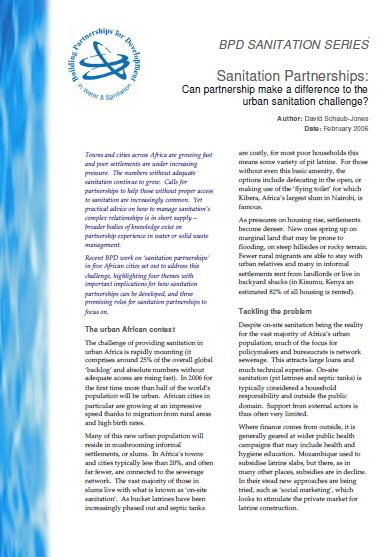
Published in: 2006
Publisher:
Building Partnerships for Development (BPD), Water and Sanitation for the Urban Poor (WSUP), UK
Author:
Schaub-Jones, D.
Uploaded by:
SuSanA secretariat
Partner profile:
common upload
4753 Views
17 Downloads
Content - Summary
This Sanitation Series document describes four important themes within sanitation partnerships in Africa, and three main roles on which they can focus.
Towns and cities are growing fast and poor settlements are under increasing pressure. The numbers without adequate sanitation continue to grow. Calls for partnerships to help those without proper access to sanitation are increasingly common. Yet practical advice on how to manage sanitation’s complex relationships is short supply – broader bodies of knowledge exist on partnership experiences in water or solid waste management.
Recent BPD work on “sanitation partnerships” in five African cities set out to address this challenge, highlighting four themes with important implications for how sanitation partnerships can be developed, and three promising roles for sanitation partnerships to focus on.
BPD set out with the goal of deepening understanding of whether and how partnerships can improve on-site sanitation for the urban poor. So is the focus on sanitation partnerships warranted? The above suggests that partnership approaches can indeed serve a useful purpose in on-site sanitation. However we urge a more sober recognition of the challenges involved. Collaboration is not easy. Partnerships in water and solid waste are more prevalent, yet we know from other work that they take considerable time and effort to get off the ground. IN the short term at least, one needs considerable faith in the value of that investment. The scarcity of existing partnerships for sanitation implies that they are even more difficult to build and to maintain than in other sectors. The diversity that characterises sanitation calls for particular attention to process issues, careful consideration of context, and strong analysis of the framework within which they can operate. Relying on evidence from five case studies in Africa and discussions with a wide variety of practitioners, policymakers and analysts operating globally, this work and its considerations are offered as a step in this direction.
Bibliographic information
Schaub-Jones, D. (2006). Sanitation Partnerships: Overview Paper. Building Partnerships for Development (BPD), Water and Sanitation for the Urban Poor (WSUP), UK
Filter tags
English Faecal sludge treatment processes Sub-Saharan Africa Urban informal settlements (slums)















